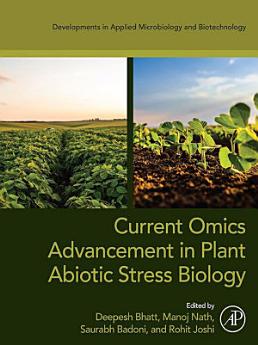Current Omics Advancement in Plant Abiotic Stress Biology
About this ebook
About the author
Dr. Deepesh Bhatt is working as an assistant professor at the Department of Biotechnology, Shree Ramkrishna Institute of Computer Education and Applied Sciences, Sarvajanik University, Surat, Gujarat, India. Earlier he worked as an associate research scientist at the Department of Research and Development, Mahyco Ltd. He has previously served as a postdoctoral research associate at the National Institute of Plant Biotechnology, New Delhi. His core area of research includes plant stress physiology, molecular cloning, and functional validation of stress-induced genes and their promoters. His other domain of work entails making use of nanotechnology in altering secondary metabolites in plants. He has published more than 33 research and review articles and chapters in reputed international journals. He has edited a book published by Springer Nature. He is a lifetime member of the Association of Microbiology of India and was awarded the Young Scientist by the Uttarakhand Council of Science and Technology.
Dr. Manoj Nath is presently working as a scientist at ICAR-Directorate of Mushroom Research, Solan, Himachal Pradesh. He worked as an assistant professor at Amity Institute of Microbial Technology, Amity University, Noida, Uttar Pradesh. Besides, he showed responsibility as a principal investigator in a project sponsored by the DST-SERB Early Career Research Award. He spent several years as postdoctoral research scientist at various renowned places in India, including the International Centre for Genetic Engineering and Biotechnology, New Delhi. He has published more than 40 research articles and book chapters for journals with international repute. He has edited a book published by Springer Nature.
Dr. Saurabh Badoni is presently working as a scientist at the International Rice Research Institute South Asia Regional Centre in Varanasi, India. He has also been working as a Department of Biotechnology (DBT)-Ramalingaswami Fellow, being a recipient of Ramalingaswami Re-Entry Fellowship, which is one of the highly prestigious fellowships of the DBT, Government of India. Earlier he has served as a postdoctoral fellow at the headquarters of the International Rice Research Institute (IRRI) in Laguna, Philippines. He has also previously served as an international consultant to IRRI, Philippines, and a postdoctoral research associate at the National Institute of Plant Genome Research (NIPGR), New Delhi, after completing his PhD from G. B. Pant University of Agriculture and Technology, Pantnagar, India. He is a member of the Crop Science Society of the Philippines (lifetime), Philippines, Australasian Grain Science Association, Australia, and Indian Society of Genetics and Plant Breeding, India. He was honored with the Young Scientist Award by the State Science Academy (Uttarakhand), India, and IRRI-PDF. He has published more than 25 research articles in peer-reviewed journals and book chapters of international repute and is serving as an editor and a reviewer for a number of eminent journals.
Dr. Rohit Joshi is currently working as a senior scientist cum assistant professor (AcSIR), Biotechnology Division, at the CSIR-Institute of Himalayan Bioresource Technology, Palampur, Himachal Pradesh, India. After completing his PhD from G. B. Pant University of Agriculture and Technology, Pantnagar, he did his postdoctoral research at various prestigious institutions, such as Jawaharlal Nehru University, New Delhi, India; Indian Agricultural Research Institute, New Delhi, India; International Centre for Genetic Engineering and Biotechnology, New Delhi, India; and School of Plant, Environmental, and Soil Sciences, Louisiana State University, Baton Rouge, LA, United States. He handled 12 projects as a principal investigator or coprincipal investigator and published more than 84 research articles and chapters in journals and books of international and national repute. He is also serving various peer-reviewed journals as an associate editor (Plant Physiology Reports), an academic editor (PLOS ONE), a guest editor (Biology and Genes), a review editor (Frontiers in Plant Science and Pantnagar Journal of Research), and a reviewer (82 journals). For his contribution in research, he was elected as a member of the National Academy of Sciences, India, 2021 and Plant Tissue Culture Association of India, in 2020. He was also awarded the R.D. Asana Gold Medal Award and Young Scientist Award by the Indian Society for Plant Physiology, IARI, New Delhi, India.





